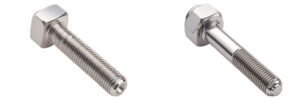Hi, I’m Monica from Hengrui Fastener. I’ve worked in the fastener industry for over 15 years. I help customers solve bolt problems every day. One of the most common problems I see is shear failure. This means the bolt breaks sideways when the force is too strong. It can cause big damage. Let me show you the 6 most common reasons bolts fail in shear, and how to avoid them. learn to What Is Shear Failure in Bolts?

1. Excessive Shear Load
Bolts have a limit. If the shear force is too strong, the bolt will break. This often happens when the load is higher than expected. It can also happen during accidents, shocks, or sudden changes in the machine. The bolt may break in a straight line across its body.
To stop this from happening, you must choose a bolt with the right shear strength. Always leave some extra safety. If the bolt is in a single shear connection, it will break easier than a double shear connection.
2. Over-Torquing During Installation
Using too much force when tightening bolts can damage them. This is called over-torquing. When this happens, small cracks may form inside the bolt. You may not see the damage right away, but later, the bolt can fail under normal shear force.
Use a torque wrench to control the force during installation. Follow the torque value in the product guide or standard. If you need high control, use tension control bolts or special bolts with built-in torque indicators.
3. Bolt Fatigue
Shear failure does not always happen quickly. Sometimes, it happens slowly after the bolt shakes or moves for a long time. This is called fatigue. Small repeated forces can make tiny cracks in the bolt. These cracks grow bigger over time. In the end, the bolt breaks — usually across the shear line. This often happens in machines that turn or move a lot, like motors, vehicles, or wind turbines.
To avoid fatigue, use bolts that resist vibration and have good surface treatment. You can also use lock washers or locking nuts to stop the bolt from moving again and again.
4. Undersized or Low-Quality Bolts
If you use a bolt that is too small or made with poor materials, it may break easily. I once visited a site where a tower bolt broke just after installation. We checked and found the bolt had wrong size, bad material, and no heat treatment.
Always choose bolts from a trusted supplier. Ask for material test reports. Do not use bolts without quality documents, especially for big projects. A low-quality bolt can cost you more money later.
5. Improper Joint Design
Even if you choose the best bolt, the connection must also be correct. If the holes are too close to the edge, or too big, the bolt may not hold the load properly. This can lead to stress concentration, which increases the chance of shearing.
Good design helps share the force evenly. Try to use double shear joints if possible. Also, use washers or spacers to reduce stress and protect the bolt.
6. Corrosion and Embrittlement
Corrosion happens slowly, but it can make the bolt weak. In wet or salty environments, bolts can rust and lose strength. Another hidden problem is hydrogen embrittlement. This happens when hydrogen gets inside the bolt during plating or treatment. It makes the bolt very brittle and easy to break.
To avoid this, use bolts with the right surface coating, like hot-dip zinc or Dacromet. Make sure the bolts pass hydrogen removal tests after plating. In harsh environments, choose stainless steel or other corrosion-resistant materials.
Conclusion
Each shear failure has a cause. Most of them can be stopped before they happen. Use the right bolt, install it correctly, and check your design. If you’re not sure which bolt is best for your project, I’m happy to help.
📧 Email: info@hrfastener.com
FAQ – More on Bolt Shear Failure
Q: What’s the difference between shear failure and tension failure?
Shear failure cuts the bolt across the side.
Tension failure pulls the bolt apart from top to bottom.
Both are dangerous and need different solutions.
Q: Can stainless steel bolts handle shear better?
Yes, stainless steel is good for corrosion. But for high shear strength, carbon steel bolts (like Grade 10.9 or 12.9) are usually stronger.
Q: How can I calculate a bolt’s shear strength?
Use this formula:
Shear Strength = (π × d² / 4) × shear stress
Where d is the bolt diameter.
Q: What are other failure types besides shear?
- Tension failure
- Thread stripping
- Fatigue failure
- Hydrogen embrittlement
- Torsion (twist) failure






